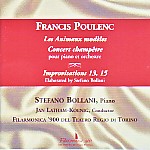Poulenc’s ballet Les animaux modèles is typically delightful, and it has enjoyed very few recordings. This one is proficient but somewhat lacking in sheer character. The orchestra plays well, but the strings aren’t as suave as they could be and the winds can turn a bit strident. Some of this, of course, is called for in the various stylized animal characterizations (Les deux coqs), but at other times a more winsome response wouldn’t be amiss (this lion, let us not forget, is “amoureux”). Still, it’s nice to see the complete ballet getting some attention.
I also really wanted to welcome this recording of the Concert champêtre in its optional piano alternative. The work is so marvellous and yet so rarely heard because of the problems attendant on finding a harpsichord of sufficient size and volume. Even most recordings get the balances wrong, so I am 100 percent in favor of using the piano if this means the work will see more performances in concert (and on disc). Alas, this rendition resolves nothing in this regard.
You would think that the choice of a piano would at least resolve issues of balance and timbre, but oddly enough the instrument that Stefano Bollani plays has a wooden tone and lack of brilliance in its upper register that proves lethal to Poulenc’s sprightly passagework. At the same time, bass lines that normally stand out easily against the orchestra in most performances with harpsichord vanish here without a trace.
Nor is the interpretation any more winning. In both the first-movement allegro and the finale’s presto the players must speed up from their initial tempo, meaning obviously that they need to leave room to get faster. Bollani leads off both movements so swiftly that he has nowhere to go when Poulenc asks for greater energy, and the result not only lacks poise, grace, and humor, but forces the orchestral strings to hang on for dear life. I don’t understand why conductor Jan Latham-Koenig put up with it. The result hardly sounds as if the players liked the music in the first place, and if a performance of this piece doesn’t at least convey that quintessential Poulenc-ish wit, then what on earth is the point?
Finally, as a “bonus”, and I use the term guardedly, Bollani “elaborates” two of Poulenc’s Improvisations for solo piano. What he thinks he’s doing is anyone’s guess, but the result hardly does him credit. He doesn’t so much paint a mustache on this particular Mona Lisa–it’s more like giving her a bad case of acne. A mixed bag then, despite decent engineering, and sadly not a release that lives up to its promise.
































